Politics
The Honorable Chairman of INEC, Prof. Mahmood Yakubu, and the Commission’s members continued today with its quarterly consultative meeting with the Inter-Agency Consultative Committee On Election Security (ICCES) in preparation for the #EdoDecides2024 and #OndoDecides2024 Governorship Elections at the Commission’s Conference Hall in Abuja.
Published
12 months agoon
By
Ekwutos Blog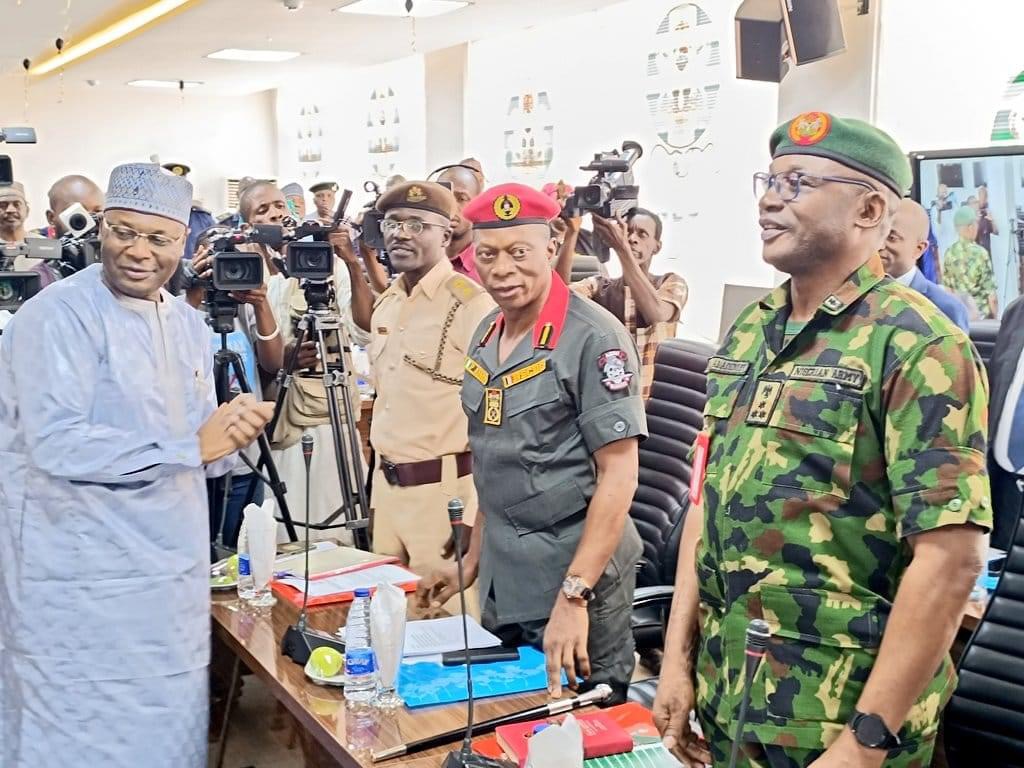
The National Security Adviser and Co-Chair of ICCESS
The Inspector General of Police
National Commissioners of INEC
Representatives of various Security, Intelligence and Law Enforcement Agencies
Other Members of ICCESS
Secretary to the Commission
Other Senior Officials of the Commission
Members of the INEC Press Corps
Ladies and Gentlemen
1. I am pleased to welcome you all to our second regular quarterly consultative meeting for the year following the first meeting held on Friday 22nd March 2024.
2. However, this is our third meeting this year with the security agencies in the last four months. You may recall that on 23rd January 2024, we met to review the security arrangement for the bye-elections and Court-ordered re-run elections in 26 States of the Federation. I am glad to report that except for two State constituencies in Enugu and Kano States, the elections in 45 constituencies have been concluded without major incidents and winners declared. I wish to place on record my appreciation and that of the co-chair of ICCES (the National Security Adviser) for the proactive measures taken by the security agencies in ensuring the peaceful conclusion of the elections involving 4,904,627 registered voters spread across 80 Local Government Areas, 575 electoral Wards and 8,934 Polling Units.
3. Following consultations with stakeholders, the Commission is remobilising to conclude the outstanding re-run elections in Enugu South 1 State Constituency of Enugu State and Ghari (formerly known as Kunchi Local Government Area) for the Ghari/Tsanyawa State Constituency of Kano State. Similarly, I would like to inform you of vacancies in four States of the Federation that will necessitate bye-elections in three State Assembly constituencies and one Federal Constituency, as a result of death or resignation of Honourable Members. As soon as necessary preparations are concluded, the Commission will announce the dates for bye-elections in Khana 2 State Constituency of Rivers State, the Bagwai/Shanono State constituency of Kano State, the Zaria Kewaye State Constituency of Kaduna State and the Garki/Babura Federal Constituency of Jigawa State. Again, we look forward to working with the security agencies to secure the environment for peaceful elections.
4. In addition to these bye-elections, the Commission is preparing for two major off-cycle Governorship elections in Edo and Ondo States. The Edo State Governorship election is holding in the next four months on Saturday 21st September 2024 while the Ondo Governorship election holds in the next six months on Saturday 16th November 2024.
5. There are two activities relating to the forthcoming Governorship elections that we need to draw your attention to. First is the Continuous Voter Registration (CVR) in the two States that will enable eligible citizens who are not registered voters to do so. Similarly, those who are registered voters will also have the opportunity to transfer their registration from other States of the Federation to Edo and Ondo States or from one location to another within the States. Complaints about lost or damaged voters’ cards will be considered during the registration period. The CVR will take place simultaneously in the two States from Monday 27th May 2024 to Wednesday 5th June 2024 from 9.00am to 3.00pm daily including the weekend. During the period, uncollected Permanent Voters’ Cards (PVCs) from previous registrations in the two States will also be available for collection by registered voters.
6. The CVR will take place at Ward level and our State headquarters. This means that there will be 192 Ward registration centres in Edo State and 203 centres in Ondo State in addition to our State offices in Benin City and Akure, making a total of 397 registration centres in the two States. Each centre will be managed by two officials drawn from our regular staff and the National Youth Service Corps (NYSC). We need security protection for the registrants, registration personnel, equipment, observers and journalists that will cover the exercise. The detailed locations of the registration centres have been compiled in a detailed 28-page document included in your folders for this meeting to guide your operational plans to secure the process.
7. The Commission has published the final list of candidates for Edo following the conclusion of party primaries and the end of the period for withdrawal and substitution of candidates as provided in the Timetable and Schedule of Activities for the election. Campaign in public by political parties commenced on Wednesday 24th April 2024 and will end at midnight on Thursday 19th September 2024 i.e. 24 hours before the date fixed for the election as provided by law.
8. I urge you to keep your eyes on the electioneering process with a view to preventing violent attacks or negative mobilisation by political parties, candidates and their supporters during their campaigns. Similarly, the use of the power of incumbency to deny opposition parties and candidates access to public facilities such as Radio and Television stations, public buildings for campaigns and rallies or even outdoor advertising through the imposition of excessive fees and levies often result in the breach of the peace. These actions, including the mutual destruction of campaign materials and facilities, violate the provisions of Sections 91 to 97 of the Electoral Act 2022. The security agencies have a duty to ensure the enforcement of the law.
9. Once again, I welcome you all to this meeting. I thank you and God bless.
You may like
No bombs, guns, attack plans – IPOB reacts to evidence presented against Nnamdi Kanu


Arsenal vs PSG: TV channel, kick off time & how to watch for free


Gunmen kill physiotherapist on duty in UBTH
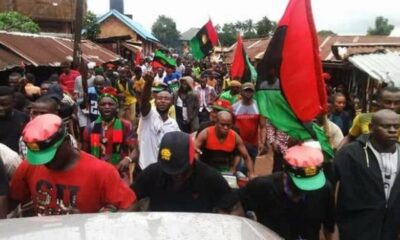

Biafra agitators fume as US ambassador meets leadership of Fulani herdsmen
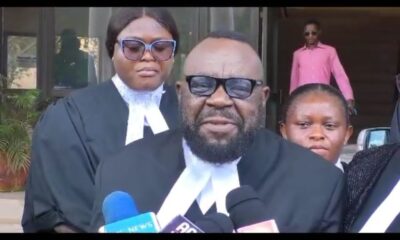

Biafra: We’ll prove Nnamdi Kanu committed no offense – IPOB lawyers


NEMA receives 203 Nigerians stranded in Libya
Politics
SENATOR NATASHA TENDERS HILARIOUS APOLOGY TO AKPABIO
Published
5 hours agoon
April 29, 2025By
Ekwutos Blog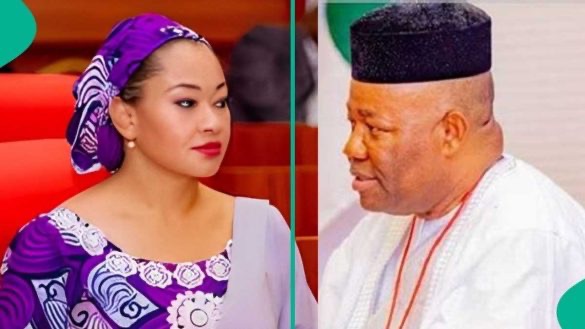
Politics
Biafra agitators ready to dialogue with Nigerian Govt – Ohanaeze’s Isiguzoro
Published
11 hours agoon
April 29, 2025By
Ekwutos Blog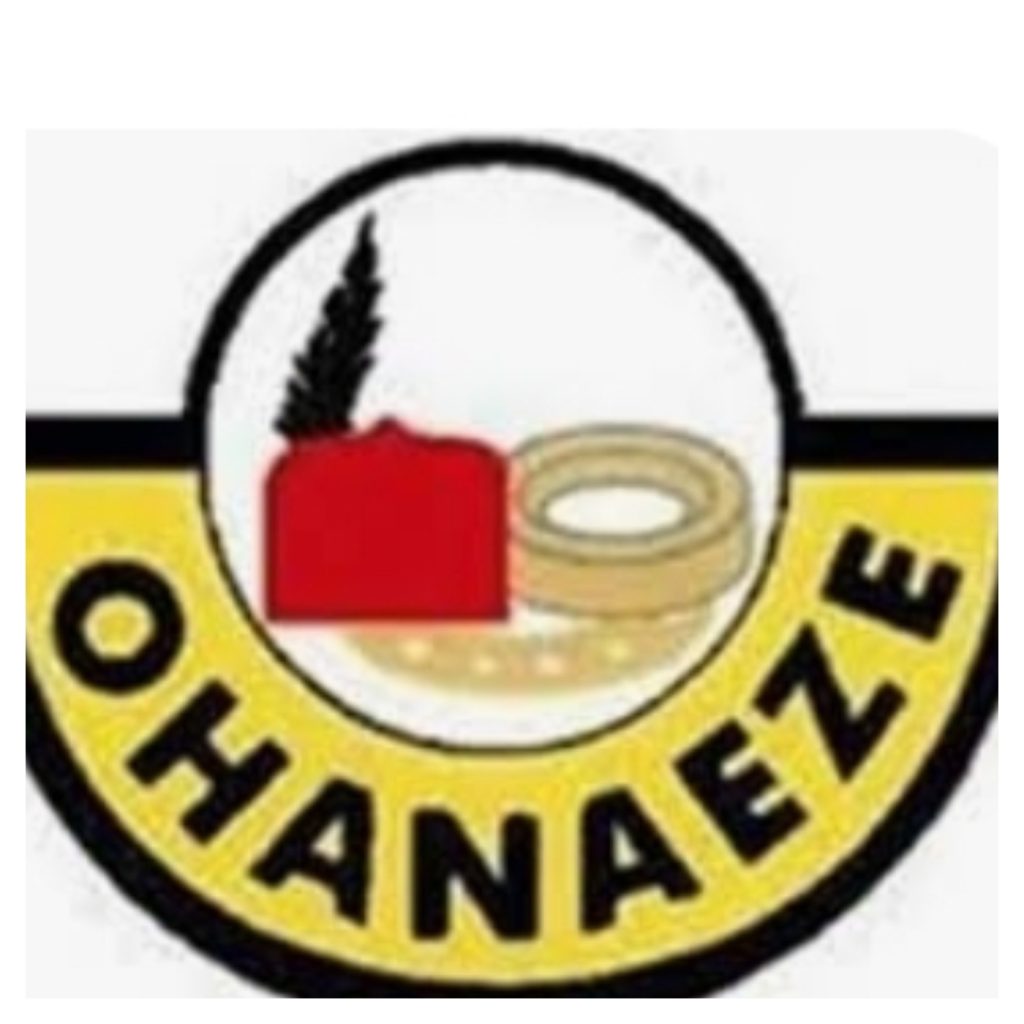
Apex lgbo socio-cultural organization, Ohanaeze Ndigb has disclosed that Biafra agitators are ready to dialogue with the federal government on the way forward.
In a statement on Tuesday by Ohanaeze’s factional Deputy President General, Mazi Okechukwu Isiguzoro, the apex body noted that the dialogue has the potential to usher in monumental changes, including the release of all prisoners of conscience, notably Nnamdi Kanu, the reopening of the Eastern Economic Corridor, and an unequivocal end to violence disguised as agitation.
“It is our earnest hope that those misled into cycles of violence and armed struggle will choose to abandon their hostile actions, paving the way for a peaceful and prosperous Southeast.
“In a significant and historic turning point for the geopolitics of Nigeria, the Ohanaeze Ndigbo, the apex sociocultural organisation representing the Igbo people, formally acknowledges the courageous decision of the Nonviolent Pro-Biafra Agitators to extend a hand of peace towards the Federal Government of Nigeria.
“Following twelve years of relentless diplomatic pressure from the international community and numerous United Nations-affiliated peace groups, urging these advocates for self-determination to embrace peaceful negotiations, this moment is both profound and transformative.”
Ohanaeze proclaimed that the acceptance by the non-violent Pro-Biafra agitators to offer a dove of peace and a hand of friendship to the federal government was a pivotal moment in Nigeria’s historical timeline.
Isiguzoro said, “this forthcoming dialogue is anticipated to mirror the earlier discussions held at Aburi, Ghana, now reborn as the ‘Abuja Accord’.
“This initiative aims explicitly to address and resolve the long-standing grievances that have birthed the Biafra agitation since the cessation of hostilities in the Nigerian Civil War in 1970.
“The non-violent Pro-Biafra agitators have extended an olive branch to President Bola Ahmed Tinubu’s administration, inviting the federal government to engage in a constructive dialogue over the nagging ‘Igbo Question’.”
He said the dialogue sought to confront the unresolved issues stemming from the unimplemented policies of reconciliation, reconstruction, and rehabilitation envisioned by General Yakubu Gowon following the war.
Politics
APC will capture 3 remaining S’South states – Gov Otu
Published
12 hours agoon
April 29, 2025By
Ekwutos Blog
Leader of the national ruling party in South South geopolitical zone in Nigeria, Governor Bassey Otu of Cross River State has assured that APC will surely capture the remaining three states governed by the opposition, Peoples Democratic Party, PDP.
Governor Otu emphasized that Cross River, which for years stood as the lone APC-governed state in the South-South, now proudly shares the progressive banner with Delta and Edo States.
Recall that yesterday the Vice President Shettima Kashim, national chairman of APC, Dr. Abdullahi Ganduje, and Gov Otu formally received Delta State Governor, Sheriff Oborevwori, into the APC family.
The three states ruled by PDP presently include Akwa Ibom, Bayelsa and Rivers State, although now under emergency rule of a sole administrator for six months following suspension of Governor Sim Fubara.
Otu, who spoke on his return to Calabar, the Cross River capital, said: “An increasing number of South-South states under APC governance is a dream realized.”
Governor Otu noted that when the other three states are finally captured, it will set the stage for deeper regional collaboration, accelerated economic development, and greater political stability.
Otu, who is also the Vice Chairman of the South-South Governors’ Forum, urged Governor Oborevwori, other political stalwarts, and their supporters who have now joined the APC to bring their wealth of experience and grassroots mobilization strength to bear in advancing the collective quest for a flourishing South-South and a renewed Nigeria.
Governor Otu assured that together in APC, “the six states shall chart a new course of greatness for the region and our nation.”
No bombs, guns, attack plans – IPOB reacts to evidence presented against Nnamdi Kanu

Arsenal vs PSG: TV channel, kick off time & how to watch for free

Gunmen kill physiotherapist on duty in UBTH
Trending

 Trending6 months ago
Trending6 months agoNYA demands release of ‘abducted’ Imo chairman, preaches good governance
- Business6 months ago
US court acquits Air Peace boss, slams Mayfield $4000 fine

 Politics6 months ago
Politics6 months agoMexico’s new president causes concern just weeks before the US elections
- Entertainment6 months ago
Bobrisky transferred from Immigration to FCID, spends night behind bars
- Entertainment6 months ago
Bobrisky falls ill in police custody, rushed to hospital

 Politics6 months ago
Politics6 months agoRussia bans imports of agro-products from Kazakhstan after refusal to join BRICS

 Politics6 months ago
Politics6 months agoPutin invites 20 world leaders
- Politics1 year ago
Nigerian Senate passes Bill seeking the establishment of the South East Development Commission.

